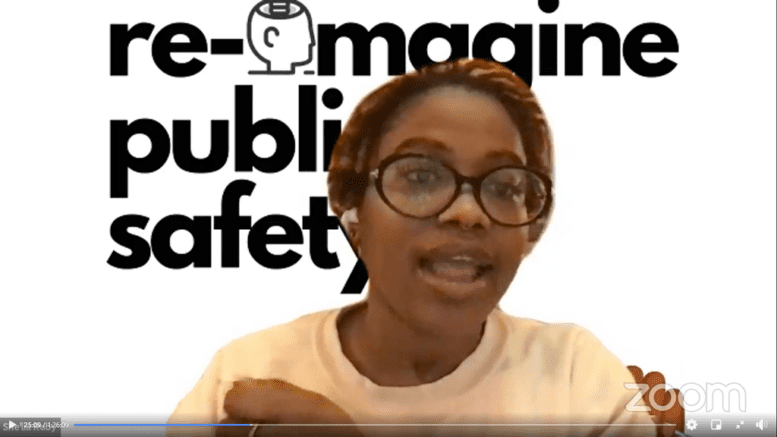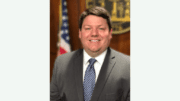“I would like to say that as a prison abolitionist, that I don’t believe anyone should go to jail or prison for anything,” activist Alexa Vaca told a virtual audience during this year’s Martin Luther King, Jr. Day.
The Cobb County Southern Christian Leadership Conference held an MLK Day event titled “Crime and Punishment: Where do we go from here?”
At the event, a youth panel discussed problems with the criminal justice system and proposed solutions.
Some of those solutions exist outside the current framework of the United States’ criminal justice system.
Cobb SCLC member Branden Stokes asked questions about criminal justice to the SCLC’s “Youth Speak Out” panel.
The panel consisted of Vaca, the co-founder of KSUnited, a group of Kennesaw State University students, staff, faculty and community members dedicated to ending racism at KSU, Emory Paul, the founder and co-chair of Cobb County’s High School Democrats and She’lia Roby, an organizer with the Movement for Black Lives, an organization fighting systemic racism around the country.
Stokes asked the panelists a variety of questions about reforming the U.S. criminal justice system.
One question Stokes asked was whether everyone who comes in contact with law enforcement should go to jail.
Roby said she did not think so because everyone who comes in contact with police does not have the same experience.
She said that sending everyone to jail fails to recognize their humanity.
Roby also said that in the criminal justice system the approach is often harsher to Black, Brown and poor people.
Paul agreed with Roby and also said the reasons people commit crimes must be examined.
“Was it because of poverty or because of other systemic issues that led to this?” Paul said. “So we have to think of other ways to go about fixing these issues [and] rehabilitating these people rather than just saying put them in jail. [Simply sending people to jail] has never worked — it will never work.”
Vaca said that police and prisons do not fix societal issues of homelessness, drug addiction, abuse and many other problems. Instead, the country’s justice system needs a complete overhaul.
“Historically, the police system has been violent since its inception and so there is no reform to the system of police,” Vaca said. “We need to invest in [historically oppressed] communities so that these social problems improve.”
Stokes also asked whether an offender’s criminal record or the seriousness of the offenders’ should matter more in the criminal justice system.
Vaca said that U.S. society must move away from calling things offenses because offenses and the concept of crime are social constructs that constantly oppress people.
Vaca said the criminal justice system upholds the oppressive systems of white supremacy and capitalism. Instead, she shifted Stokes’ question.
“Is it an offense that black and brown people have to live in an oppressive society every day?” Vaca asked. “Is that an offense? So we have to talk about, what does an offense mean and also move away from legitimizing what the system’s calling offenses or crimes.”
Next, Stokes asked if there are any crimes that should not result in a prison sentence or probation.
Paul said drug use must be decriminalized. He said the War on Drugs “has always had a racist intent to target and mass incarcerate black and brown communities.”
Reforming the criminal justice system to say that people can go to jail for only using certain drugs does not go far enough, Paul said. Legalizing drug use can be an opportunity for addicts to get the help they need for their addiction instead of sending drug users to jail.
Both Vaca and Roby described themselves as prison and police abolitionists.
Abolition means getting rid of prisons and police and creating a community where people have the resources they need to survive, they explained.
“Abolition is about presence, it’s not about getting rid of things,” Roby said. “It is about presence and it is about compassion and the things that are supposed to be available for all people.”
Vaca, Roby and Paul agreed that if people had access to resources like homes, drug addiction treatment, food, water and other resources then prison and policing would become obsolete.
Essentially, people having the resources needed to live comfortably could end crime.
Roby pointed to the police killing of Rayshard Brooks, a Black man, in Atlanta last summer.
Roby said Atlanta police did not need to kill Brooks.
Instead, Brooks, who was drunk, could have been provided resources like an Uber or had someone escort him home safely.
Toward the end of the panel, Vaca responded to a question from Cobb Board of Education member Leroy “Tre” Hutchins about calls to defund the police. This call stemmed from Black Lives Matter protests last summer.
“I think a lot of people went [to] ‘defund the police’ when abolition sounded too harsh, and so defunding the police is part of prison abolition, it’s a way to achieve prison abolition,” Vaca said.
Roby also said defunding the police is simply a policy demand and not the huge deal that politicians have been making.
“Because [defund the police is] coming from the mouths of those who are oppressed and marginalized, it is an issue,” Roby said. “Anytime that we have any uprising or black and brown people standing in their full agency, it’s an issue.”
Defunding the police is to put money into poor, Black and Brown, and other communities, Roby, Paul and Vaca agreed.
The call to defund the police also means empowering marginalized communities and allowing them to control their own community, they said.
“We need to have these tough conversations about how we want to address the police and how we want to figure out this issue because we can’t just simply say, ‘oh let’s just reform this,’ ‘let’s fire this cop,’ ‘let’s defund this program,’ no, because that will never actually address the issue,” Paul said.

Arielle Robinson is an undergrad at Kennesaw State University. She is the president of the university’s Society of Professional Journalists and an editor at the KSU Sentinel. She enjoys music, reading poetry and non-fiction books and collecting books and records.





